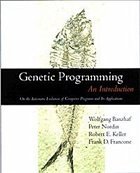Nicht lieferbar

Genetic Programming, An Introduction
On the Automatic Evolution of Computer Programs and Its Applications
Mitwirkender: Banzhaf, Wolfgang; Keller, Robert E.; Nordin, Peter
Versandkostenfrei!
Nicht lieferbar
Since the early 1990s, genetic programming (GP)-a discipline whose goal is to enable the automatic generation of computer programs-has emerged as one of the most promising paradigms for fast, productive software development. GP combines biological metaphors gleaned from Darwin's theory of evolution with computer-science approaches drawn from the field of machine learning to create programs that are capable of adapting or recreating themselves for open-ended tasks. This unique introduction to GP provides a detailed overview of the subject and its antecedents, with extensive references to the pu...
Since the early 1990s, genetic programming (GP)-a discipline whose goal is to enable the automatic generation of computer programs-has emerged as one of the most promising paradigms for fast, productive software development. GP combines biological metaphors gleaned from Darwin's theory of evolution with computer-science approaches drawn from the field of machine learning to create programs that are capable of adapting or recreating themselves for open-ended tasks. This unique introduction to GP provides a detailed overview of the subject and its antecedents, with extensive references to the published and online literature. In addition to explaining the fundamental theory and important algorithms, the text includes practical discussions covering a wealth of potential applications and real-world implementation techniques. Software professionals needing to understand and apply GP concepts will find this book an invaluable practical and theoretical guide.



